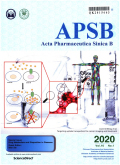- 钛学术文献服务平台 \
- 学术期刊 \
- 医药卫生期刊 \
- 药学期刊 \
- 药学学报(英文版)期刊 \
TMEM16A inhibits angiotensin Ⅱ-induced basilar artery smooth muscle cell migration in a WNK1-dependent manner
TMEM16A inhibits angiotensin Ⅱ-induced basilar artery smooth muscle cell migration in a WNK1-dependent manner
基本信息来源于合作网站,原文需代理用户跳转至来源网站获取
摘要:
Vascular smooth muscle cell(VSMC)migration plays a critical role in the pathogenesis of many cardiovascular diseases.We recently showed that TMEM16A is involved in hypertension-induced cerebrovascular remodeling.However,it is unclear whether this effect is related to the regulation of VSMC migration.Here,we investigated whether and how TMEM16A contributes to migration in basilar artery smooth muscle cells(BASMCs).We observed that AngⅡ increased the migration of cultured BASMCs,which was markedly inhibited by overexpression of TMEM16A.TMEM16A overex-pression inhibited AngⅡ-induced RhoA/ROCK2 activation,and myosin light chain phosphatase(MLCP)and myosin light chain(MLC20)phosphorylation.But AngⅡ-induced myosin light chain kinase(MLCK)activation was not affected by TMEM16A.Furthermore,a suppressed activation of integrinβ3/FAK pathway,determined by reduced integrinβ3 expression,FAK phosphorylation and F-actin rearrangement,was observed in TMEM16A-overexpressing BASMCs upon AngⅡ stimulation.Contrary to the results of TMEM16A overexpression,silencing of TMEM16A showed the opposite effects.These in vitro results were further demonstrated in vivo in basilar arteries from VSMC-specific TMEM16A transgenic mice during AngⅡ-induced hypertension.Moreover,we observed that the inhibitory effect of TMEM16A on BASMC migration was mediated by decreasing the activation of WNK1,a Cl--sensitive serine/thre-onine kinase.In conclusion,this study demonstrated that TMEM16A suppressed AngⅡ-induced BASMC migration,thus contributing to the protection against cerebrovascular remodeling during AngⅡ-infused hypertension.TMEM16A may exert this effect by suppressing the RhoA/ROCK2/MLCP/MLC20 and in-tegrinβ3/FAK signaling pathways via inhibiting WNK1.Our results suggest that TMEM16A may serve as a novel therapeutic target for VSMC migration-related diseases,such as vascular remodeling.

推荐文章
豚鼠耳蜗血管纹TMEM16A随鼠增龄的表达变化
跨膜蛋白16A(TMEM16A)
血管纹
年龄相关性听力损失
听性脑干反应
钙激活氯通道 TMEM16 A在大鼠心房和心室中的表达差异
TMEM16A
钙激活氯通道
心房
心室
TMEM16A:钙激活氯通道研究进展
钙激活氯通道(CaCCs)
跨膜蛋白16A
分子基础
构效关系
特异性
肿瘤
内容分析
关键词云
关键词热度
相关文献总数
(/次)
(/年)
引文网络
引文网络
二级参考文献 (0)
共引文献 (0)
参考文献 (0)
节点文献
引证文献 (0)
同被引文献 (0)
二级引证文献 (0)
2021(0)
- 参考文献(0)
- 二级参考文献(0)
- 引证文献(0)
- 二级引证文献(0)
引文网络交叉学科
相关学者/机构
期刊影响力
药学学报(英文版)
主办单位:
出版周期:
双月刊
ISSN:
2211-3835
CN:
10-1171/R
开本:
出版地:
北京市先农坛街1号
邮发代号:
创刊时间:
语种:
eng
出版文献量(篇)
688
总下载数(次)
0
总被引数(次)
1428
期刊文献
相关文献
推荐文献
- 期刊分类
- 期刊(年)
- 期刊(期)
- 期刊推荐

 免费查重
免费查重










